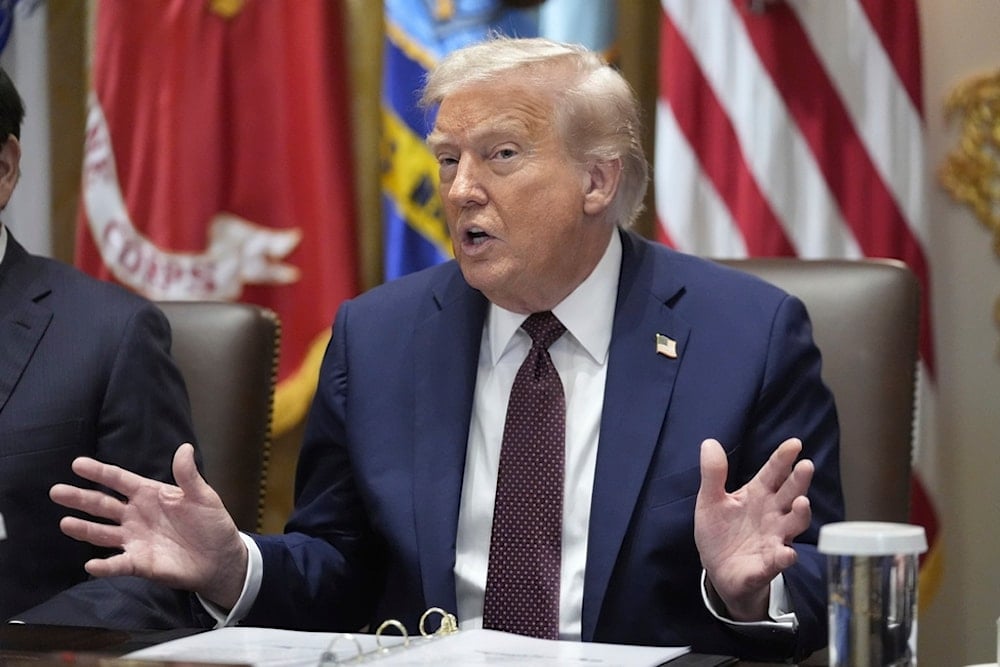Trump's 'antiwar' pledge gave way to expanding militarism: Newsweek
A Newsweek opinion piece argues Trump’s second term has deepened US militarism abroad and at home, echoing research that post-9/11 wars have caused at least 4.5 million deaths worldwide.
-

President Donald Trump speaks during a cabinet meeting, Tuesday, Aug. 26, 2025, at the White House in Washington. (AP Photo/Mark Schiefelbein)
An opinion piece written by Azadeh Shahshahani and Khury Petersen-Smith in Newsweek argues that Donald Trump's presidency, once marketed as a break from endless wars, has instead ushered in new and more aggressive forms of militarism. The authors point out that Trump had promised, "I'm not going to start a war. I'm going to stop the wars," but contend that his policies have led to the opposite outcome.
According to the piece, US military actions have intensified in regions stretching from the Middle East to East Africa. Somalia, for example, has been subjected to repeated airstrikes since Trump returned to office, including what the Pentagon described as its largest operation in the country's history. In Yemen, air campaigns were abruptly halted after failing to meet US objectives, while Washington also backed "Israel" during its devastating aggression on Iran earlier this year.
The analysis delves into another dimension of Trump's security policy: applying the logic of the post-9/11 "war on terror" to Latin America and the Caribbean.
By labeling Mexican drug cartels, as well as gangs in El Salvador, Venezuela, and Haiti, as "terrorist organizations," Trump has opened the door for military responses that mirror tactics used in the Middle East. The authors draw comparisons to Salvadoran President Nayib Bukele's massive prison system, which has become notorious for arbitrary detentions under the banner of counterterrorism.
Domestically, Trump has ramped up enforcement powers to an unprecedented level. The piece notes that his latest budget boosts funding for US Immigration and Customs Enforcement (ICE) to $37.5 billion annually, dwarfing the defense budgets of many countries.
Military deployments have also extended onto American streets, with National Guard units sent to Washington, DC, and Marines dispatched to several states in support of immigration crackdowns. The article suggests these moves are more about consolidating authority and pushing vulnerable communities out of sight than addressing genuine threats.
The authors conclude that Trump's second term has not fulfilled the promise of reducing US involvement in wars. Instead, they argue it has entrenched and expanded them, warning that "our demands for justice must include a future where we end these wars once and for all."
Read more: Colombian President Petro warns against attack on Venezuela
Costs of post-9/11 wars
The warnings in the Newsweek piece echo findings from a May 15 report by Brown University’s Watson Institute for International and Public Affairs. The study estimates that US-led wars in the Middle East and North Africa since 2001 have directly or indirectly caused at least 4.5 million deaths and displaced millions more.
Nearly one million were killed directly in wars across Afghanistan, Iraq, Pakistan, Syria, Yemen, Libya, and Somalia, while another 3.6 to 3.7 million died indirectly from economic collapse, disease, hunger, and destroyed health systems.
"These wars are ongoing for millions around the world who are living with and dying from their effects," the report states, underscoring that women and children "suffer the brunt of the impact." It adds that "indirect deaths are devastating, not least because so many of them could be prevented, were it not for war."
Despite the US withdrawal from Afghanistan in 2021, the study notes that Afghans continue to suffer and die at some of the highest rates since the war began. The authors call for Washington to provide reparations for the harm caused, arguing that "reparations, though not easy or cheap, are imperative."
Stephanie Savell, co-director of the Costs of War project, emphasized the need for awareness of what she called the "reverberating costs" of conflict: "The human cost of war, that people in the United States, for the most part, don’t really know enough about or think about."

 4 Min Read
4 Min Read








